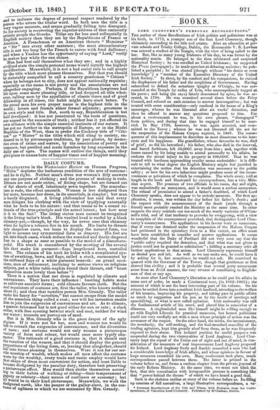DAILY COSTUME.
EXPATIATING in the Westminster Review on Human Progress, "Helix" deplores the barbarous condition of the arts of costume: and he is right. Neither man's dress nor woman's fitly answers any one purpose of clothing ; and the process of making is rude. Dresses are not made entire, of fitting shape, but are formed out of flat sheets of stuff, laboriously sewn together. The manufac- ture is rude' the effect uncouth. Woman is less disfigured than her mate, because her dress, in its essentials, is simpler ; but man is basely disguised. A living philosopher has said that every man designs his clothing with the view of typifying externally what he feels to be his nature : and that seems to be a sound ra- tionale of the true principle and the actual intent ; but how near is it to the fact? The living statue man cannot be recognized in the living tailor's block. His vaulted head is roofed by a black chimney-pot,--though, by the way, he never uses that chimney when he lights a tobacco fire in his mouth. His limbs he thrusts into shapeless cases, too loose to display the natural form, too light to assume any symmetrical form as drapery. His feet are put into black cases, which reduce the rounded and finely-fingered foot to a shape as near as possible to the model of a pianoforte- pedal. His trunk is encumbered by the meeting of the several bits that make his garment—flaps lengthened here, curtailed there. The column of his neck he hides with a complicated sys- tem of swathing, bows, and flaps, called a stock, surmounted by the stiffened flaps of a white garment beneath : on grand occa- sions, men of refinement, inclining to serious views on religions subjects, put a white table-napkin round their throats, and "boast themselves more lovely than before"!
There is a notion that our dress is regulated by climate and convenience. They' have their influence : bustling habits make ns cultivate succinct forms; cold climate favours cloth. But the real regulators of costume are, first the tailor, who knows nothing about it; and then that tasteless person Mrs. Grundy. The tailor racks his fancy for "novelties," but cannot escape from the model of the senseless thing called a coat; nor will his invention enable him to join the exigencies of convenience and art. As to climate, a narrow-brimmed hat is not good either for sun or rain ; a slack collar, with free opening betwixt stock and coat, neither for wind nor water ; trousers are purveyors of mud.
But it is Mrs. Grundy who is the great despot of the ugly regime. If it were not for her, men and women too would be left to consult the exigencies of convenience, and the diversities of taste ; and costume would not only resume a picturesque variety of form and colour, but would once more typify cha- racter. The rationale of a good costume is, that it should suit the vocation of the wearer, and that it should display the general Proportions of the living form, or, leaving that altogether, should fall into forms pleasing in themselves. Were it not for our ser- vile worship of wealth, which makes all men affect the costume worn by the wealthy, every trade and rustic employ would have that shape of dress most convenient for action, and least liable to become disfigured by the peculiar duty, therefore best preserving a picturesque effect. Men would then clothe themselves accord- ing to their habits of walking or riding—their temperament of gayety or sobriety—their means of costliness or economy ; but all. would be in their kind picturesque. Meanwhile, we walk the disfigured earth, like the pauper or the galley-slave, in the cos- tume of ugliness to which we are sentenced by Mrs. Grundy.


























 Previous page
Previous page